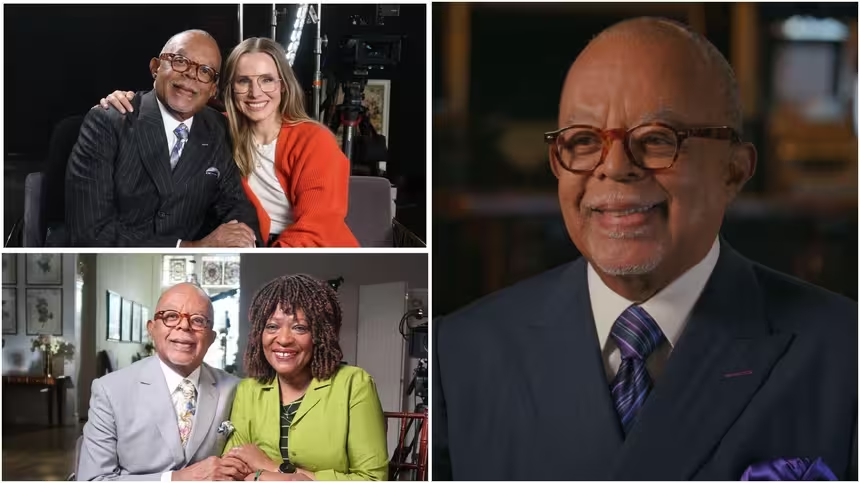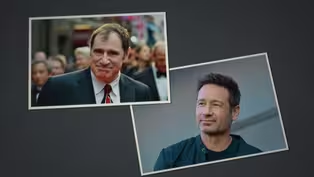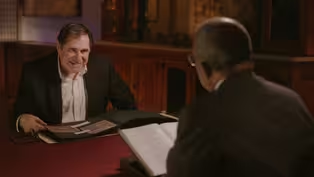Finding Your Roots
Why Did David Duchovny's Family Come to America Then Leave?
Clip: Season 9 Episode 7 | 7m 19sVideo has Closed Captions
David Duchovny traces his family journey to New York, separation and reunion.
David Duchovny and Professor Henry Louis Gates, Jr. trace the story of David's family journey to New York, the separation, reunion and tragic circumstances that later led to his great-grandfather relocating to Israel.
Problems playing video? | Closed Captioning Feedback
Problems playing video? | Closed Captioning Feedback
Corporate support for Season 11 of FINDING YOUR ROOTS WITH HENRY LOUIS GATES, JR. is provided by Gilead Sciences, Inc., Ancestry® and Johnson & Johnson. Major support is provided by...
Finding Your Roots
Why Did David Duchovny's Family Come to America Then Leave?
Clip: Season 9 Episode 7 | 7m 19sVideo has Closed Captions
David Duchovny and Professor Henry Louis Gates, Jr. trace the story of David's family journey to New York, the separation, reunion and tragic circumstances that later led to his great-grandfather relocating to Israel.
Problems playing video? | Closed Captioning Feedback
How to Watch Finding Your Roots
Finding Your Roots is available to stream on pbs.org and the free PBS App, available on iPhone, Apple TV, Android TV, Android smartphones, Amazon Fire TV, Amazon Fire Tablet, Roku, Samsung Smart TV, and Vizio.
Buy Now

Explore More Finding Your Roots
A new season of Finding Your Roots is premiering January 7th! Stream now past episodes and tune in to PBS on Tuesdays at 8/7 for all-new episodes as renowned scholar Dr. Henry Louis Gates, Jr. guides influential guests into their roots, uncovering deep secrets, hidden identities and lost ancestors.Providing Support for PBS.org
Learn Moreabout PBS online sponsorship- [Henry] We'd already told David Duchovny an incredible story, revealing how his grandfather, Moshe and his great-grandfather Abraham, came to America after a harrowing journey across Russia, Palestine, and Egypt.
But this story was not over.
When Moshe arrived in America, his mother Doba and many of his siblings were still back in Egypt.
It would take an enormous effort to reunite the family, culminating with a ship that arrived in the Port of New York on June 9th, 1920.
Would you please read who was on that ship?
- Doba Duchovnia, age 36.
Feiga Duchovnia, age 17.
Herchel, age 15.
Shmuel, age 13.
Sima, age nine.
Race, Jewish.
Not Hebrew now, now they're Jewish.
Last permanent residence, Alexandria, Egypt.
- [Henry] And that ship sailed from Marseille.
- That's from Marseille?
- [Henry] Yeah!
- Wow!
- Your family was reunited four years and three months after Abraham and Moshe first arrived in America.
Your great-grandmother, Doba, and four of your grandfather's siblings joined them in New York City.
- Wow.
Sorry I'm just saying wow.
I'm just thinking like, so Moshe, my grandfather, from the ages of 14 to 18, does not see his mother or siblings and then all of a sudden, he's this 18 year old kid, young man, and here comes mom.
- Right.
- And he's a New Yorker now kind of and it's just, it's a good story.
- In her mind, I mean, he's frozen in time, right?
- Yeah.
- [Henry] That had to be hard.
- Yeah.
Wow.
(light music) - Tragically, Moshe and his mother were not able to enjoy their reunion for long.
Doba died of tuberculosis just six weeks after arriving in America.
The family buried her in a cemetery in Queens, New York and emblazoned her gravestone with her photograph, allowing David the chance to glimpse her face for the very first time.
You are looking at Doba Duchovny, your great-grandmother.
(sighs) - [David] Where is that?
Queens?
- Queens.
- [Henry] Montefiore Cemetery.
- [David] I'll have to visit.
- [Henry] Do you see any family resemblance?
- Maybe.
I think she looks a little like my dad when he was like, he was kind of a chubby little kid.
(laughing) Yeah, like my dad.
- [Henry] Yeah?
- [David] Yeah, weirdly.
- And we've translated the Hebrew inscription on Doba's grave.
Would you please read what it says?
(sighs) - Here lies my wife and our beloved mother.
Modest and noteworthy in her ways, righteous and honest in her deeds, and a righteous example to her children.
Doba.
Yeah.
She made it to the states, didn't she?
- Yep, she made it and got the kids here.
- Yeah.
- [Henry] Your great-grandfather, Abraham, was about 45 years old when he became a widower.
Can you imagine?
- No.
No.
But I'm just, I'm also just so thankful that, you know, I know they didn't do it for me, but they gave my father a chance to have a different life and they gave his father, at his age of 14, you know?
- Yep.
- For whatever reasons they were running or looking, they, they made some good decisions.
- Yeah, they did.
- They made some good decisions.
I always just thought it was luck, you know?
In my mind, it was like oh, they were lucky to have gotten out before the Holocaust, that was it.
- Yeah.
- But now, I think it's more they were smart.
You know and they were, they were looking for opportunity.
They were looking for safety.
(light music) - There is one final beat to this story.
In the wake of his wife's death, David's great-grandfather, Abraham, returned to Palestine.
We found him in the 1928 census for Tel Aviv, a middle aged man living on his own, not far from the place where he'd once worked as an innkeeper.
How bout that?
Your family's full of surprises.
- They're like, they got a little cross over happening.
- [Henry] Yeah.
- They don't go exactly where you think, they zig when you think they're gonna zag.
- Yes.
- [David] He went back to Israel.
- Yes, did you have any idea?
- No.
No!
- He returned to where he had originally intended to immigrate.
And do you have any idea if Moshe ever went to visit?
- God, I don't know.
I'm just thinking Moshe was 18 when he went back, when Abraham went back.
So, he's a young man.
I guess he could take care of himself and they maybe never saw each other again.
I don't know.
- Yeah.
Would you please turn the page?
David, this is a gravestone in Israel's Nahalat Yitshak Cemetery.
Would you please read the translation of the Hebrew inscription?
(sighs) - [David] Here rests the honorable man, Abraham Duchovny, departed December 5th, 1942, at age 68.
- [Henry] That is your great-grandfather's grave in Israel.
What's it like to see that?
- My life has been so easy compared to them.
You know, I didn't grow up with a bunch of money, but I grew up in Manhattan and my parents were you know, middle class folks.
They worked.
I ate, I stayed at the same apartment.
You know?
I didn't fear for my life.
- Mmhm.
- I didn't think we were gonna be forced to move.
It's solid.
I had a solid childhood.
You know?
It just, a few years earlier, that would not have been the case had I been born-- - 3,000 miles away.
- [David] Yeah.
- Yeah.
- So, I'm just lucky in that way and the question becomes, you know, what, what do you owe or, you know, what's your responsibility?
- Yeah.
- I don't know.
Video has Closed Captions
Preview: S9 Ep7 | 32s | David Duchovny and Richard Kind trace their Jewish roots from Europe and the Middle East. (32s)
I'm Gonna Cry Aren't I?:Richard Kind's Holocaust Connection
Video has Closed Captions
Clip: S9 Ep7 | 5m 34s | Much to his surprise, actor Richard Kind discovers that he had ancestors in the Holocaust. (5m 34s)
Providing Support for PBS.org
Learn Moreabout PBS online sponsorship
- History
Great Migrations: A People on The Move
Great Migrations explores how a series of Black migrations have shaped America.












Support for PBS provided by:









